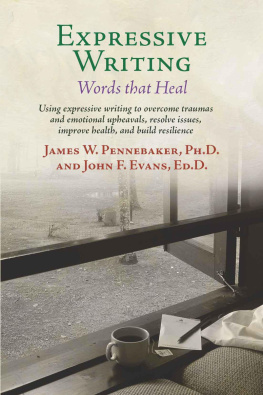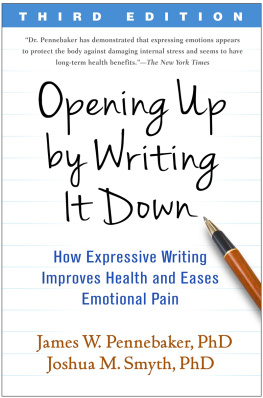The Psychology of Physical Symptoms
Opening Up: The Healing Power of Expressing Emotion
Writing to Heal
Emotion, Disclosure, and Health (as editor)
Collective Memories of Political Events (as editor)
This is the only footnote you will see in this book. For more background on specific topics, check the notes section at the back of the book. A reference section is also included. Online exercises can be found at www.SecretLifeOfPronouns.com.

Copyright 2011 by James W. Pennebaker
All rights reserved. No part of this book may be used or reproduced in any manner whatsoever without
written permission from the publisher except in the case of brief quotations embodied in critical articles
or reviews. For information address Bloomsbury Press, 175 Fifth Avenue, New York, NY 10010.
Published by Bloomsbury Press, New York
LIBRARY OF CONGRESS CATALOGING-IN-PUBLICATION DATA
Pennebaker, James W.
The secret life of pronouns : what our words say about us /
James W. Pennebaker. - 1st U.S. ed.
p. cm.
Includes bibliographical references and index.
ISBN: 978-1-60819-480-3 (hardcover)
1. English languagePronoun. 2. English languageGrammar. I. Title.
PE1261.P46 2011
425'.55dc22
2011001289
First published in the United States by Bloomsbury Press in 2011
This e-book edition published in 2011
E-book ISBN: 978-1-60819-497-1
www.bloomsburypress.com
For you
and for us
and where we have been
and where we will go.
Contents
Chapter 1
Chapter 2
Chapter 3
Chapter 4
Chapter 5
Chapter 6
Chapter 7
Chapter 8
Chapter 9
Chapter 10
APPENDIX
S TOP FOR A minute and think about your last conversation, e-mail, or text message. You think you said something about dinner plans, your laundry, a strategy for the next sales meeting. And you probably did. But at the same time, you said much, much more. The precise words you used to communicate your message revealed more about you than you can imagine.
You, a, am, to, I, but, the, for, not
Pronouns, articles, prepositions, and a handful of other small, stealthy words reveal parts of your personality, thinking style, emotional state, and connections with others. These words, typically called function words, account for less than one-tenth of 1 percent of your vocabulary but make up almost 60 percent of the words you use. Your brain is not wired to notice them but if you pay close attention, you will start to see their subtle power.
Function words behave differently than you might think. For example, the most commonly used word in spoken English, I , is used at far higher rates by followers than by leaders, truth-tellers than liars. People who use high rates of articles a , an , the do better in college than low users. And if you want to find your true love, compare the ways you use function words with that of your prospective partners.
Although this book focuses on function words, it really isnt about parts of speech at all. Rather, its about how these words serve as windows into peoples personalities and social connections. My training and early research bridged the areas of social, personality, clinical, and health psychology. Only through some accidental discoveries did I even notice the existence of these stealth words.
At first, the study of function words was a side venture. But as I delved more deeply into the topic, I started making some unexpected connections to leadership, mental health, brain function, and other issues. Soon, my students and I were spending time with computer engineers, linguists, FBI agents, lawyers, doctors, and marketing gurus, and with colleagues in history, political science, communications, and even accounting. And, most recently, we have been swept up in the social media frenzyapplying our ideas and methods to Twitter, Facebook, online dating, blogging, instant messaging, e-mail, and even the occasional old-fashioned telephone call.
This book is a little like a travel guide. It is organized around some of my favorite topics in psychology and the social sciencespersonality, gender, deception, leadership, love, history, politics, and groups. The goal is to show how the analysis of function words can lead to new insights in each of these topics. At the same time, I want you to appreciate ways of thinking about and analyzing language. No matter what your personal or professional interest, I hope you come to see the world differently and can use this knowledge to better understand yourself and others.
A REVOLUTION IS under way in the analysis of language that will have a profound effect on the social sciences and humanities. The words that people generate in their lifetimes are like fingerprints. Increasingly, these words can be used to establish peoples identities and even their backgrounds. Language use, especially the use of function words, can signal peoples social networks and the roles they play in their families, in their neighborhoods, and at work. Wherever there is a word trail, a host of new computer-based methods can follow it. Shakespeare, Confucius, authors of ancient religious texts, politicians, and novelists have left behind a mind-boggling number of words that scholars from all disciplines can now study with new eyes and unprecedented tools.
Although the analysis of language is the focus of this book, it is really a work of psychology. Whereas linguists are primarily interested in language for its own sake, Im interested in what peoples words say about their psychological states. Words, then, can be thought of as powerful tools to excavate peoples thoughts, feelings, motivations, and connections with others. With advancements in computer technologies, this approach is informing a wide range of scholars across many disciplineslinguists, sociolinguists, English scholars, anthropological linguists, neuroscientists, psycholinguists, developmentalists, computer scientists, computational linguists, and others. Some of the most innovative work is now coming from collaborations between academics of all stripes and companies such as Google.
If you are interested in the topics or approach of this book, there are a handful of very bright thinkers and writers whose work is accessible to a wide audience. Some who have influenced my approach the most include the sociologist Erving Goffman, the linguist George Lakoff, the cognitive scientist Steven Pinker, the sociolinguist Deborah Tannen, and the anthropologist Anna Wierzbicka.
The contributions of many others have directly affected my thinking about the fundamental connections between word use and psychological state. Freuds early work on slips of the tongue marked the first psychological acknowledgment that unintended words that pop out of our mouths can reveal hidden thoughts and feelings. Later psychoanalysts, such as Louis Gottschalk and Walter Weintraub, provided road maps on how to link seemingly innocuous words to deeper motivations and fears that patients were expressing.
Several computer-based text analysis systems presaged my own computer work, especially Philip Stones General Inquirer program in the 1960s. Any comprehensive story about the early days of text analysis also includes names such as Doug Biber, Herb Clark, Donald Foster, Howard Giles, Rod Hart, Robert Hogenraad, Hans Kordy, Klaus Krippendorf, Colin Martindale, Erhard Mergenthaler, and others.
The people who have influenced me the most, however, have been my students and colleagues over the years. This book reflects the collaborative effort of dozens, even hundreds, of people. Those who have been most central to the current language project include Jenna Baddeley, David Beaver, Roger Booth, Martha Francis, Art Graesser, Carla Groom, Jeff Hancock, Molly Ireland, Ewa Kacewicz, Laura King, Matthias Mehl, Kate Niederhoffer, Keith Petrie, Nairn Ramrez-Esparza, Stephanie Rude, Yitai Seih, Richard Slatcher, Lori Stone Handelman, and Yla Tausczik. Bill Swann, Bob Josephs, and my other colleagues in the psychology department at the University of Texas at Austin have also been important in guiding my work.
Next page









